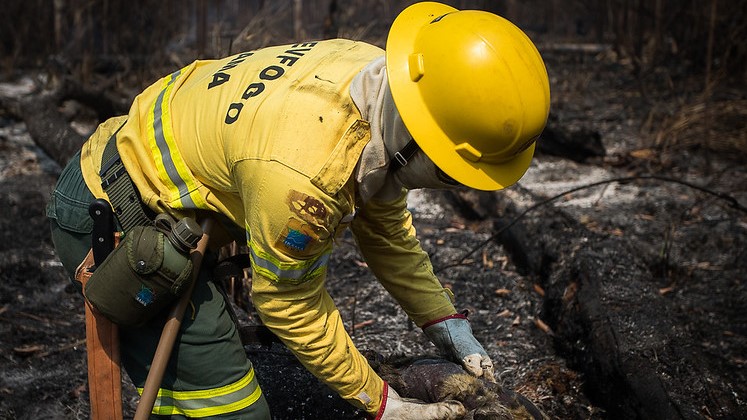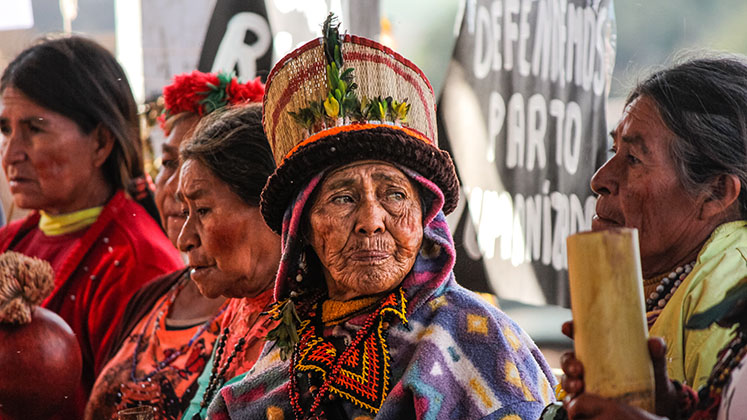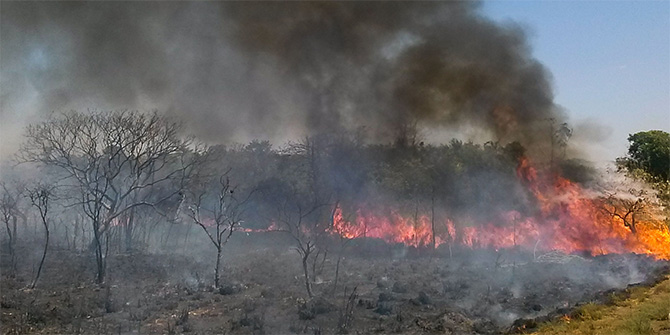There is a global hype around nature-based solutions and Brazil is no exception. In this post, Claudia Horn (LSE International Development) contextualizes the country’s role in the current negotiations and critiques this approach.
COP26 summit started with a particular emphasis on forest protection, nature-based solutions, the role of forests as carbon sinks, and net-zero. On the second day, more than 100 country leaders, including Brazil, Canada, Russia, Indonesia, the US, and the UK, who is leading the conference, signed a forest agreement, pledging to halt and reverse deforestation and forest degradation 2030.
Amazon deforestation has been in the headlines during Jair Bolsonaro’s leadership. So, what does the signing of this agreement mean to a mega-diverse country like Brazil? What are the chances that this reverses the trend in land conflict, violence, forest burning, and deforestation?
What’s at stake in Glasgow
This year, climate negotiations seek to define the rulebook of the Paris Agreement, in particular, Article 6 on the mechanisms of mitigation, finance, and cooperation. Some of these flexibilise the way countries can achieve their emissions targets, including offsetting emissions by buying excess credits from other countries (Article 6.2) or implementing sustainable development projects, such as reforestation in the Global South. In the case of proposed market mechanisms—linked to the controversial net-zero—the reduction of emissions or removals can be transferred from one country to another. For developed countries and companies, this implies alternatives to cutting emissions to reach “net-zero,” incentivising and compensating developed tropical countries that integrate their forests as global carbon sinks.
Brazil increased its emissions during the economic contraction due to the COVID19 pandemic due to high deforestation in the Amazon. The Bolsonaro government has lost credibility ever since its disputes with long-time partners such as Norway and Germany, the donors of the Amazon Fund. Breaking with its traditional resistance to developed countries’ promotion of carbon markets under the Workers Party governments, the country has now been favourable to forest offsets in recent years. Despite the absence of Bolsonaro, which some argue is strategic, Brazil wants to revive a green image at this summit, especially of its agriculture and livestock sector.
For Brazil, signing the forest agreement is attractive because it could receive significant donor funds and improve its commercial options as a principal commodities exporter. On the outside, the government delegation contrasts with the concerning disarray at COP25 in Madrid. Some argue this year’s team is more modest and reasonable, seemingly “stepping up” its climate commitments to cutting 50% of emissions by 2030. Moreover, some argue the appointment of Joaquim Leite, replacing the “anti-environment” minister Ricardo Salles, meant a turning point in record deforestation in the Amazon and other biomes and rural violence.
But the governmental agenda is consolidating a questionable “environmentalism of results” established under Salles. Only days before the COP, the government published a “Green Growth” program without any precise targets or accountability mechanisms.
Brazil’s representation in Glasgow consists of two competing spaces. One is hosted by the government, the Brazilian Confederation of Livestock, the Brazilian National Confederation of Industry, Brazil’s Trade Agency Apex, and the Ministries of Environment and Foreign Affairs. During an event on November 2, the Secretary of the Amazon and Environmental Services (MMA) and the Market Development Advisor for Natural Climate Solutions at the International Emissions Trading Association (IETA) promoted Brazil’s nature-based solutions for the world as a central part of its green growth strategy.
Only a few steps apart, the Brazil Climate Action Hub is organized by civil society organizations and convenes environmentalists, forest peoples’ organizations, opposition, and former environmental minister Izabela Teixeira. Though not promoting carbon markets or nature-based solutions, the discussions mainly accept international market.
For instance, indigenous representatives demanded direct funding at another event. At the same time, 101 organizations and associations officially denounced markets instruments for forest protection and net-zero and demanded more democratic mitigation measures that ensure the territorial rights of forest populations.
Since the early 2000s, many of Brazil’s state governors, especially in the Amazon, have been promoting forest offsets and symbolically distancing themselves from the federal government, though they continue to support market mechanisms. They have created the consortium Green Brazil and 13 of Brazil’s 26 state heads are represented at COP26 to reinforce the subnational commitment to the environmental agenda and secure finance for socio-environmental projects through their funds.
In any event, the United Nations Framework Convention on Climate Change (UNFCC) remains an intergovernmental forum, and decision and veto power with countries that have signed the Paris Agreement and assume commitments linked to it through their Nationally Determined Contributions (NDC).
The Brazilian private sector is also promoting nature-based solutions at COP26. This includes companies such as Vale, JBS, Natura, and Havaianas, where they intend to make net-zero commitments independently from the Brazilian government. However, companies do not guarantee environmental and social accountability.

Dismantling institutions and building market mechanisms in Brazil
There has been a push towards nature-based solutions and market mechanisms internationally and in Brazil. But it supposes that deforestation should actually and verifiably decrease, which is not the case in the moment. Between 2004 and 2012, Brazil reduced forest loss by 80%, though based on law enforcement, monitoring, and socioenvironmental civil society pressure on public and private agencies rather than carbon markets.
Kathryn Hochstetler, Professor and Head of the Department of International Development at LSE in a recent blog post reminds of the importance of country-level implementation through diverse, locally suited environmental institutions that make or break the success of any multilateral climate agreement, ensuring socioenvironmental accountability and mitigation results.
But the Bolsonaro government has systematically underfunded and dismantled the command and control agencies central to fighting deforestation. It has changed the leadership in institutions such as the Brazilian Institute of Environment and Renewable Natural Resources (IBAMA), the Chico Mendes Institute for Biodiversity Conservation (ICMBio), and Brazil’s National Institute for Space Research (INPE). All public organs concerned with environmental inspection, issuing fines, monitoring, and licensing. Moreover, the government paralysed the demarcation of Indigenous Lands and the implementation of agrarian reform. In fact, the just-signed forest agreement conflicts with Bolsonaro’s plan to allow mining in indigenous areas.
In this connection, Free, Prior, and Informed Consent is central to nature-based solutions’ social integrity and sustainability. However, in April of 2019, Bolsonaro extinguished per decree civil society councils within federal administration, including the Amazon Fund Orientation Committee and the National Commission coordinating REDD+ in Brazil. The government has criminalised social and environmental NGOs and activists and , it has eliminated the protection of territorial rights and just benefit sharing.
Since 2019, Brazil’s government has engaged in domestic efforts to privatise conservation and increased control of the Armed Forces in place of environmental agencies. Created in 2021, the “Adopt a Park” program sought private investments in Conservation Units and met the interest of Coca-Cola, Carrefour, and Heineken to improve their green image. In addition, the “Nature Parks Concession Structuring Program” of the development bank BNDES promotes the privatization of parks throughout Brazil. Ultimately, the Floresta+ program consolidates Brazil’s environmental services market.
Tim Forsyth, Professor of Environment and Development, urges scrutiny to nature-based solutions in his post on the International Development blog at LSE. The fact that powerful public and private stakeholders have “stepped up” their engagement in the climate negotiations does not imply results on the ground. On the contrary, the Brazil case suggests fragmentation and conflicts over resources and civil society exclusion, especially given the lack of regulatory agencies and policies.
In his speech at the COP, Boris Johnson said, “As consumers, we’ll all be able to enjoy guilt-free chocolate. I suppose that’s carbon-guilt-free, not calorie-guilt-free chocolate.” In this sense, net-zero mechanisms may well be incentives to offset emissions, not to reduce them.
257 organisations and movements from 61 countries rejected nature-based solutions in a statement released on November 2. They called it a distraction from fossil carbon and industrial agriculture. People around the world and especially in developing countries need climate action urgently. But there is no shortcut to a socioecological just transition.
Notes:
• This post was originally published in the LSE International Development blog
• The views expressed here are of the authors rather than the Centre or the LSE
• Please read our Comments Policy before commenting
• Banner image credit: Rodrigo Jorda / Shutterstock.com






I believe there’s a potentially serious problem that, for whatever reason, goes basically unmentioned by the mainstream media: that of theologically-inclined people who get into high office with their dangerous disregard — or even contempt — for the natural environment.
A good example of this is Brazil’s Evangelical president Jair Bolsonaro, who theocratically declared two summers ago — in the midst of unprecedented Amazonian rainforest wildfire (home to a third of all known terrestrial plant, animal and insect species) — that his presidency (and, I presume, all of the environmental damage he inflicts while in high office) was “fulfilling a mission from God”. What matters most to Bolsonaro is the creation of jobs, however limited or temporary, and economic stimulation, however intangible the concept when compared to the grand-scale, consequential environmental destruction.
There’s a general belief held by Bible-following Christianity, that to defend the natural environment, even from the world’s greatest polluters, is to go against God’s will and therefore is inherently evil. Some among them may even credit the bone-dry-vegetation areas uncontrollably burning, along with global warming, to some divine wrath upon collective humankind’s sinfulness.
Also, many of Canada’s leading conservative politicians, not to mention our previous prime minister (i.e. Stephen Harper, close friend to Postmedia’s then-CEO Paul Godfrey), are/were ideologically aligned with the pro-fossil-fuel mainstream American Evangelical community and Republican Party. They generally share the belief that to defend the natural environment from the planet’s greatest polluters, notably big fossil fuel, is to go against God’s will and therefore is inherently evil. Some even credit the bone-dry-vegetation areas uncontrollably burning in California each year to some divine wrath upon collective humankind’s ‘sinfulness’.